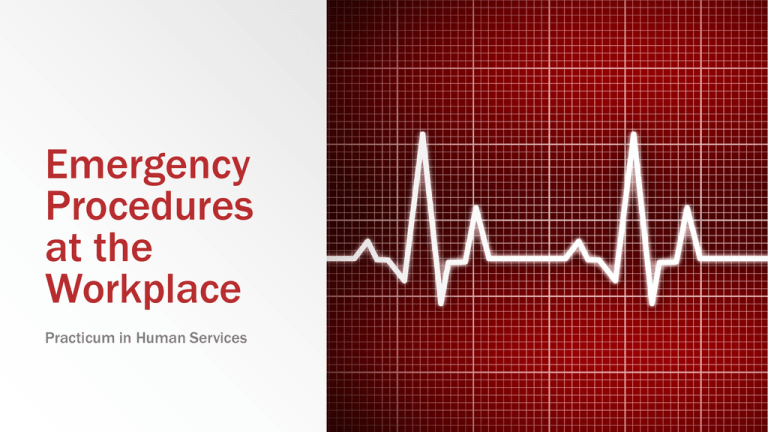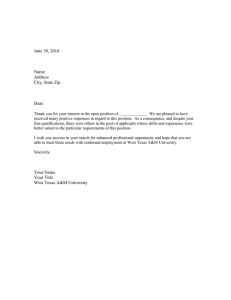
Emergency
Procedures
at the
Workplace
Practicum in Human Services
Copyright
Copyright © Texas Education Agency, 2015. These Materials are copyrighted © and trademarked ™ as the
property of the Texas Education Agency (TEA) and may not be reproduced without the express written
permission of TEA, except under the following conditions:
1) Texas public school districts, charter schools, and Education Service Centers may reproduce and use
copies of the Materials and Related Materials for the districts’ and schools’ educational use without obtaining
permission from TEA.
2) Residents of the state of Texas may reproduce and use copies of the Materials and Related Materials for
individual personal use only, without obtaining written permission of TEA.
3) Any portion reproduced must be reproduced in its entirety and remain unedited, unaltered and unchanged
in any way.
4) No monetary charge can be made for the reproduced materials or any document containing them;
however, a reasonable charge to cover only the cost of reproduction and distribution may be charged.
Private entities or persons located in Texas that are not Texas public school districts, Texas Education Service
Centers, or Texas charter schools or any entity, whether public or private, educational or non-educational,
located outside the state of Texas MUST obtain written approval from TEA and will be required to enter into a
license agreement that may involve the payment of a licensing fee or a royalty.
For information contact: Office of Copyrights, Trademarks, License Agreements, and Royalties, Texas
Education Agency, 1701 N. Congress Ave., Austin, TX 78701-1494; phone 512-463-7004; email:
copyrights@tea.state.tx.us.
Copyright © Texas Education Agency, 2015. All Rights Reserved.
2
What constitutes an emergency or disaster?
Copyright © Texas Education Agency, 2015. All Rights Reserved.
3
Why is it important to invest time in a
preparedness program?
Copyright © Texas Education Agency, 2015. All Rights Reserved.
4
Program Management
Typical goals of the preparedness program
include:
• Protect the safety of employees, visitors,
contractors and others at risk from hazards at
the facility. Plan for persons with disabilities
and functional needs.
• Maintain customer service by minimizing
interruptions or disruptions of business
operations
• Protect facilities, physical assets and
electronic information
• Prevent environmental contamination
Copyright © Texas Education Agency, 2015. All Rights Reserved.
5
Preparedness Planning for Business
The five steps in developing a
preparedness program are:
▪ Program management
▪ Planning
▪ Implementation
▪ Testing and exercises
▪ Program improvement
Copyright © Texas Education Agency, 2015. All Rights Reserved.
6
Planning
The planning process should take
an “all hazards” approach.
▪ Blackouts
▪ Hazardous materials incidents
▪ Household chemical
emergencies
▪ Nuclear power plants
(click on image)
Copyright © Texas Education Agency, 2015. All Rights Reserved.
7
Implementation
Implementation of the
preparedness program
includes identifying and
assessing resources, writing
plans, developing a system to
manage incidents and
training employees so they
can execute plans.
Copyright © Texas Education Agency, 2015. All Rights Reserved.
8
Testing and Exercises
Employers should conduct
testing and exercises to evaluate
the effectiveness of the
preparedness program, make
sure employees know what to do
and find any missing parts.
Copyright © Texas Education Agency, 2015. All Rights Reserved.
9
Program Improvement
There are opportunities for
program improvement
following an actual incident.
Copyright © Texas Education Agency, 2015. All Rights Reserved.
10
Emergency Guidelines
Be sure to locate:
• Potential dangers
• Emergency exits and routes
• Hand washing stations
• First aid kits
• MSDS information
Copyright © Texas Education Agency, 2015. All Rights Reserved.
11
When Emergencies Arise
▪ Emergencies happen all too
often and early intervention
can save a life.
▪ CPR and first aid skills are
important for everyone at the
workplace to know.
(click on image)
Copyright © Texas Education Agency, 2015. All rights reserved.
12
Handling Medical Emergencies
Employers and employees
must be trained in first aid to
handle medical emergencies
such as:
• Diluting or removing poisons from
an individual’s body
• Preventing severe blood
loss
• Treating burns properly
• Helping an individual to
maintain breathing
• Preventing shock
• Immobilizing head and back
injuries
Copyright © Texas Education Agency, 2015. All rights reserved.
13
First Aid Kit
A good first aid kit should always be checked and periodically restocked.
Copyright © Texas Education Agency, 2015. All rights reserved.
14
Emergency Supply List
Ready.gov asks individuals to do three
key things:
• get an emergency supply kit
• make a family emergency plan
• be informed about the different types
of emergencies that could occur and
their appropriate responses
Copyright © Texas Education Agency, 2015. All Rights Reserved.
(click on image)
15
Occupational Safety and Health Act
▪ Protects employee health and
safety
• Passed in 1970
• Requires employers to make
the workplace free of hazards
Copyright © Texas Education Agency, 2015. All Rights Reserved.
Image:
Occupational
Safety and
Health
Administration
(OSHA)
16
Exit Routes, Emergency Action Plans, Fire
Prevention Plans and Fire Protection
(click on image)
Copyright © Texas Education Agency, 2015. All Rights Reserved.
17
Review
▪ What constitutes an emergency or disaster at the workplace?
▪ Why is it important to invest time in a preparedness program?
▪ Why is it important to seriously consider many different threats
and hazards and the likelihood they will occur at the workplace?
▪ Why is it important for employers to conduct testing and exercises
to evaluate the effectiveness of the preparedness program?
▪ Name seven items that need to be in an emergency supply kit.
Copyright © Texas Education Agency, 2015. All Rights Reserved.
18
Copyright © Texas Education Agency, 2015. All Rights Reserved.
19
References and Resources
Images:
• All photos obtained through a license with Shutterstock.com™.
Websites:
• American Red Cross
Is your business or organization prepared for emergency? If you’re like most of us, the answer is no,
you’re not as prepared as you would like to be. It can be difficult to know where to begin – and where to
go from there.
http://www.redcross.org/prepare/location/workplace
• Federal Emergency Management Agency (FEMA)
FEMA’s mission is to support our citizens and first responders to ensure that as a nation we work
together to build, sustain and improve our capability to prepare for, protect against, respond to, recover
from and mitigate all hazards.
http://www.fema.gov
• Occupational Health and Safety Administration With the Occupational Safety and Health Act of 1970,
Congress created the Occupational Safety and Health Administration (OSHA) to assure safe and
healthful working conditions for working men and women by setting and enforcing standards and by
providing training, outreach, education and assistance.
http://www.osha.gov/index.html Copyright © Texas Education Agency, 2015. All Rights Reserved.
20
References and Resources
• Ready. Prepare. Plan. Be Informed
Like individuals and families, schools, daycare providers, workplaces, neighborhoods and apartment
buildings should all have site-specific emergency plans.
http://www.ready.gov/workplace-plans
• United States Department of Labor
How to Plan for Workplace Emergencies and Evacuations
https://www.osha.gov/Publications/osha3088.html
YouTube:
• Exit Routes, Emergency Action Plans, Fire Prevention Plans and Fire Protection
Monthly Employee Training courtesy of Federal Safety Solutions, LLC
https://youtu.be/GYoUWKhKQdI
• Official 2012 Hands-Only CPR Instructional Video
Learn how to perform CPR in this 60-second video showing Hands-Only CPR in action
http://youtu.be/zSgmledxFe8
Copyright © Texas Education Agency, 2015. All Rights Reserved.
21

